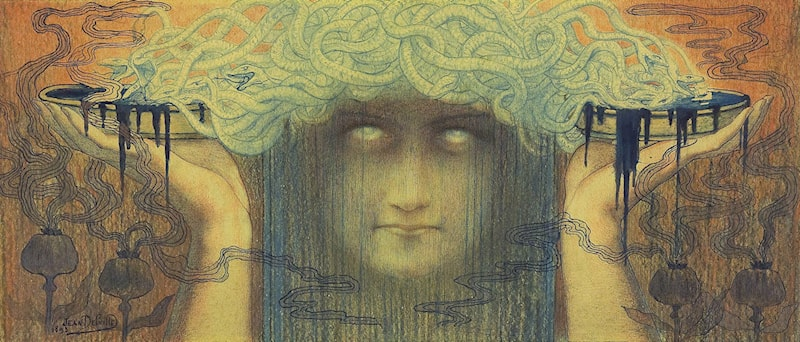created, $=dv.current().file.ctime & modified, =this.modified
tags: Myth

NOTE
The original Medusa of mythology has no reason to laugh and every reason to cry, but originally she was beautiful. Her name means guardian or protectress.
Pindar “Beautiful medusa” Ovid - “the object of jealous aspiration of many suitors”
When removing her head, Pegasus spawned from the wound along with Chrysaor.
Write. In Writing you have registered and documented something. You have created history that was not created today.
rel:Survey of Sirens - original Sirens were male and female. “Originally, sirens were shown as male or female, but the male siren disappeared from art around the fifth century BC” “This departure from using a male (Near Eastern) version of the siren, and the corresponding increased popularity of the female siren may be due to the fact that the sirens in the Odyssey are, in fact, female.”

I wished that that woman would write and proclaim this unique empire so that other women, other unacknowledged sovereigns, might exclaim: I, too, overflow; my desires have invented new desires, my body knows unheard-of songs. Time and again I, too, have felt so full of luminous torrents that I could burst-burst with forms much more beautiful than those which are put up in frames and sold for a stinking fortune. And I, too, said nothing, showed nothing; I didn’t open my mouth, I didn’t repaint my half of the world. I was ashamed. I was afraid, and I swallowed my shame and my fear. I said to myself: You are mad! What’s the meaning of these waves, these floods, these outbursts? Where is the ebullient, infinite woman who, immersed as she was in her naivete, kept in the dark about herself, led into self-disdain by the great arm of parental-conjugal phallocentrism, hasn’t been ashamed of her strength? Who, surprised and horrified by the fantastic tumult of her drives (for she was made to believe that a well-adjusted normal woman has a … divine composure), hasn’t accused herself of being a monster? Who, feeling a funny desire stirring inside her (to sing, to write, to dare to speak, in short, to bring out something new), hasn’t thought she was sick? Well, her shameful sickness is that she resists death, that she makes trouble
Every woman has known the torment of getting up to speak. Her heart racing, at times entirely lost for words, ground and language slipping away-that’s how daring a feat, how great a transgression it is for a woman to speak-even just open her mouth-in public. A double distress, for even if she transgresses, her words fall almost always upon the deaf male ear, which hears in language only that which speaks in the masculine.
Other love -In the beginning are our differences. The new love dares for the other, wants the other, makes dizzying, precipitous flights between knowledge and invention. The woman arriving over and over again does not stand still; she’s everywhere, she exchanges, she is the desire-that-gives. (Not enclosed in the paradox of the gift that takes nor under the illusion of unitary fusion. We’re past that.) She comes in, comes-in-between herself me and you, between the other me where one is always infinitely more than one and more than me, without the fear of ever reaching a limit; she thrills in our becoming. And we’ll keep on becoming! She cuts through defensive loves, motherages, and devourations: beyond selfish narcissism, in the moving, open, transitional space, she runs her risks. Beyond the struggle-to-the-death that’s been removed to the bed, beyond the love-battle that claims to represent exchange, she scorns at an Eros dynamic that would be fed by hatred. Hatred: a heritage, again, a remainder, a duping subservience to the phallus. To love, to watch-think-seek the other in the other, to despecularize, to unhoard. Does this seem difficult? It’s not impossible, and this is what nourishes life-a love that has no commerce with the apprehensive desire that provides against the lack and stultifies the strange; a love that rejoices in the exchange that multiplies. Wherever history still unfolds as the history of death, she does not tread. Opposition, hierarchizing exchange, the struggle for mastery which can end only in at least one death (one master-one slave, or two nonmasters # two dead)-all that comes from a period in time governed by phallocentric values. The fact that this period extends into the present doesn’t prevent woman from starting the history of life somewhere else. Elsewhere, she gives. She doesn’t “know” what she’s giving, she doesn’t measure it; she gives, though, neither a counterfeit impression nor something she hasn’t got. She gives more, with no assurance that she’ll get back even some unexpected profit from what she puts out. She gives that there may be life, thought, transformation. This is an “economy” that can no longer be put in economic terms. Wherever she loves, all the old concepts of management are left behind. At the end of a more or less conscious computation, she finds not her sum but her differences. I am for you what you want me to be at the moment you look at me in a way you’ve never seen me before: at every instant. When I write, it’s everything that we don’t know we can be that is written out of me, without exclusions, without stipulation, and everything we will be calls us to the unflagging, intoxicating, unappeasable search for love. In one another we will never be lacking.